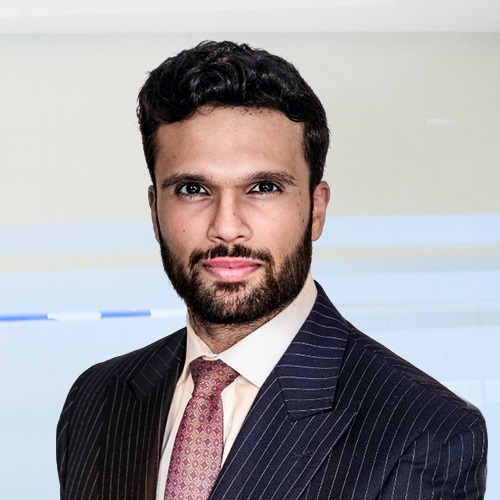Seven Questions for Kumar Pandit

Kumar Pandit, CFA
Portfolio Manager & Analyst
Kumar is a Portfolio Manager & Analyst on Polen Capital’s Emerging Markets Growth Team. He manages the India Growth strategy. Prior to joining Polen Capital in 2024, Kumar was Portfolio Manager and Head of Research at Somerset Capital. Kumar received a B.Sc. in Computer Science and Business Studies from Kingston University and is a CFA® charterholder.

From a young age, I was immersed in conversations about companies and investing, thanks to my grandfathers and parents. Their discussions sparked my curiosity, laying the foundation for my passion for investment management.
Born in England to parents of Indian and Kenyan nationalities, I was immersed in different customs and languages from an early age. Family holidays were spent in India and Africa, and this exposure to culture fueled my curiosity about emerging markets.
My investment philosophy was originally shaped by my paternal grandfather, who had built a successful financial business in Nairobi, Kenya. His key lesson—the value of investing in high-quality assets for the long term—has remained a guiding principle for me and is especially relevant to the world of emerging markets.
A common misconception is that emerging markets lack high-quality growth companies. In fact, these markets are home to global innovation leaders shaping global consumption and technology trends with billions relying on their products and
services. For example, while Nvidia often dominates the generative AI headlines, companies such as TSMC (Taiwan) and SK Hynix (South Korea), provide the essential GPUs, memory, and servers powering the AI revolution. In China, DeepSeek’s generative AI software now boasts 97 million monthly active users.1 In the auto industry, BYD is the fastest-selling EV company and is renowned for its battery technology. In e-commerce, PDD Holdings’ Temu and Mercado Libre (Brazil) continue to gain substantial market share. Before ChatGPT captured global attention, TikTok was the fastest app to reach 100 million users.2 Emerging markets are not just
following trends; they are defining them.3
Another misconception is that emerging market countries are politically and economically unstable. While they are not homogeneous, key markets are increasingly governed by pro-investment administrations. India, Vietnam, Saudi Arabia, UAE, and even Argentina are facilitating economic growth through investment-led policies. Moreover, many emerging markets are more fiscally robust, both historically and compared to some developed economies. Having avoided aggressive post-COVID stimulus, they have kept inflation largely in check, allowing for accommodative monetary policies that benefit both corporates and consumers.
In my view, India offers some of the most compelling opportunities in emerging markets, despite persistent concerns over excessive valuations. This perception has led many investors to overlook recent corrections—valuations have eased over the past six months, yet skepticism remains.
The country’s long-term growth runway is immense. For perspective, if China’s economy stopped growing today, India would need to sustain 10% annual GDP growth for 15 years to catch up. Meanwhile, Indian companies are becoming more sophisticated, driving greater demand for their goods and services.
India also holds a strategic geopolitical position, balancing relationships with both the West and key regional partners. As global supply chains evolve, India is increasingly seen as a preferred alternative, positioning itself as a vital player in future economic
expansion.
Given our long-term investment horizon, we seek out companies that can act as compounding machines, capable of sustained growth. Typically, these businesses are:
- Leaders in structurally growing industries
- Generating consistently high returns on invested capital, well above the cost of capital, and
- Producing robust cash flows, allowing them to fund growth independently without relying on external capital.
We expect these companies to build durable and expanding competitive moats, securing their leadership and enabling them to compound earnings over extended periods.
We manage these risks at both the company and portfolio level. During research, we assess industry regulations and the company’s position within that framework, alongside currency exposure—whether affecting sales or inputs. While we are not political consultants, we avoid markets with instability unless clear signs of positive change emerge. Turkey, for instance, has some excellent companies, but we maintain zero exposure due to the impact of policy decisions on businesses.
I began martial arts as a child, and over time, I’ve found striking similarities between training and investing. Discipline is key—whether in mastering techniques or sticking to an investment strategy, both demand avoiding shortcuts and learning from mistakes. Also, patience, temperament, and long-term focus are equally vital for success in both fields.
Books and podcasts have been instrumental in shaping my views on global investing. These days, I find more value in studying how entrepreneurs build successful businesses rather than focusing solely on investing legends. Their lessons often translate directly into the businesses we invest in.
Important Disclosures
1Source: Backlinko, DeepSeek AI Usage Stats for 2025, May 2025
2Source: Visual Capitalist, How Long it Took for Popular Apps to Reach 100 Million Users, July 2023
3As of March 31, 2025, TSMC, PDD, and Mercado Libre are holdings in Polen’s Emerging Markets Growth strategy. As of the same date, PDD and Mercado Libre are also holdings in Polen’s Emerging Markets ex China Growth strategy, TSMC and BYD are holdings in Polen’s Greater China Growth strategy, and BYD is a holding in Polen’s China Growth strategy.
This information has been prepared by Polen Capital without taking into account individual objectives, financial situations or needs. As such, it is for informational purposes only and is not to be relied on as, legal, tax, business, investment, accounting, or any other advice. Recipients should seek their own independent financial advice. Investing involves inherent risks, and any particular investment is not suitable for all investors; there is always a risk of losing part or all of your invested capital.
No statement herein should be interpreted as an offer to sell or the solicitation of an offer to buy any security (including, but not limited to, any investment vehicle or separate account managed by Polen Capital). This information is not intended for distribution to, or use by, any person or entity in any jurisdiction or country where such distribution or use would be contrary to local law or regulation.
Unless otherwise stated, any statements and/or information contained herein is as of the date represented above, and the receipt of this information at any time thereafter will not create any implication that the information and/or statements are made as of any subsequent date. Certain information contained herein is derived from third parties beyond Polen Capital’s control or verification and involves significant elements of subjective judgment and analysis. While efforts have been made to ensure the quality and reliability of the information herein, there may be limitations, inaccuracies, or new developments that could impact the accuracy of such information. Therefore, the information contained herein is not guaranteed to be accurate or timely and does not claim to be complete. Polen Capital reserves the right to supplement or amend this content at any time but has no obligation to provide the recipient with any supplemental, amended, replacement or additional information.
Any statements made by Polen Capital regarding future events or expectations are forward-looking statements and are based on current assumptions and expectations. Such statements involve inherent risks and uncertainties and are not a reliable indicator of future performance. Actual results may differ materially from those expressed or implied.
There is no assurance that any securities discussed herein are currently held in a Polen Capital portfolio nor that they are representative of the entire portfolio in which they are or were held. It should not be assumed that any transactions related to the securities discussed herein were (or will prove to be) profitable or that any future transactions will equal the investment performance of the securities discussed herein.
References to specific securities, asset classes and financial markets are for illustrative purposes only and are not intended to be, and should not be interpreted as, recommendations.
Past performance is not indicative of future results.
This information may not be redistributed and/or reproduced without the prior written permission of Polen Capital.
